
Birding Around Las Vegas, Red Rock Canyon National Conservation Area

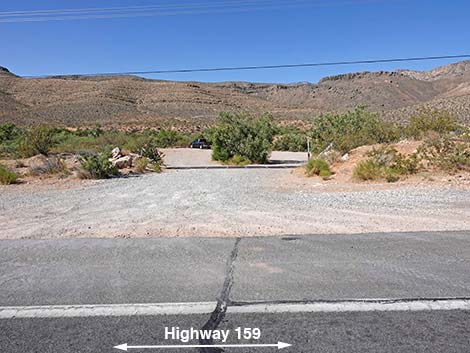 Entrance and Parking at Wheeler Camp Springs (view S) |
Description Wheeler Camp Spring, formerly a Red Rock Audubon Preserve, lies below the Red Rock Cliffs along Red Rock Wash. The preserve was established to protect the desert spring and riparian vegetation that attract birds and other wildlife to the area. Red Rock Wash normally flows during winter and early spring, but it goes dry during early summer after the snow in the surrounding mountains melts off. At Wheeler Camp, impermeable rock layers force underground water to the surface, where it flows for a short distance on the surface before disappearing into deep gravels downstream. The surface water supports a desert oasis with a shady meadow, tall Fremont's cottonwood trees, desert willow, and honey mesquite thickets, all of which is surrounded by dry Mojave Desert Scrub (e.g., Eastern Joshua trees, creosote bush, white bursage, and fourwing saltbush). Link to site map. |
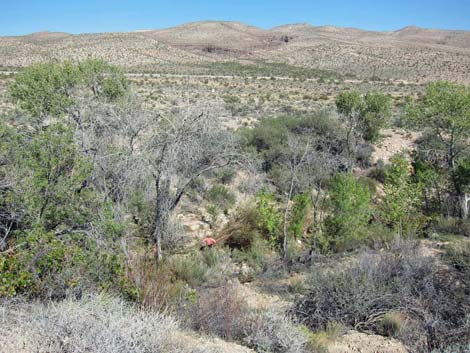 Treetops (view NE from bluffs above the wash) |
Water emerges in three areas: the wash just below the parking area, the wash at the far southeast end of the Preserve, and in the meadow under the biggest Fremont's cottonwood trees. In the wash, the upstream spring usually flows until summer, but it eventually dries during the desert heat. Historically, water has always present in the wash at the lower end of the preserve, but it has gone dry in recent years (a casualty of our climate-change driven mega-drought). The spring under the trees makes for soggy soils early in the year, but it dries out during summer too. Although no longer an Audubon preserve run by the Red Rock Audubon Society., please take care of the area. Take nothing but memories, leave nothing but footprints, and be sure to close all gates. |
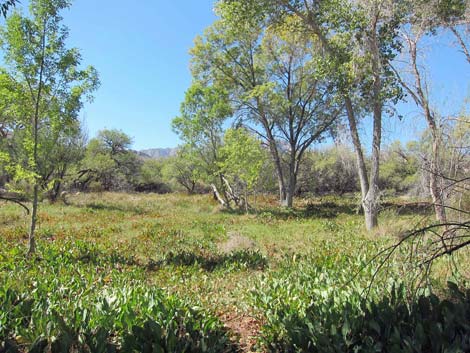 Meadow and large cottonwood trees (view NW) |
Location Wheeler Camp Spring is located in Red Rock Canyon National Conservation Area on the west side of the Las Vegas Valley, about 30 minutes from downtown, but not in the Scenic Loop Road fee area. From town, drive out to Red Rocks. From West Charleston Blvd at the Scenic Loop Road entrance, continue west and south on Charleston Blvd (Highway 159) for 6.7 miles to Wheeler Camp Spring Trailhead, on the right. |
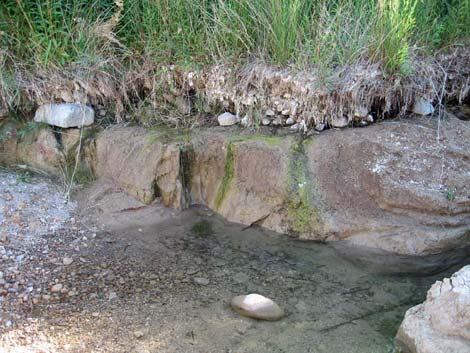 Spring pool down the wash |
From the parking area, a trail runs south through the gates (be sure to close gates securely) and down the old road towards the wash. Just across the wash, a trail branches off and runs down along the south side of the wash; this is the end of the loop. The old road continues up the other side of the wash heading for higher ground beyond the trees and mesquite thickets. The bluff gives a good tree-top view into the thickets. When the old road drops into a gully, a trail branches off to the left (north) and runs down into the mesquite thicket and under the tallest cottonwood trees. The old road continues east to the town of Blue Diamond and is heavily used by mountain bike riders and people on horseback. From the meadow under the cottonwoods, walk down the wash (no trail) for a short distance to where water flows in the creek. This isn't the most scenic creek, but the water attracts birds and other wildlife. |
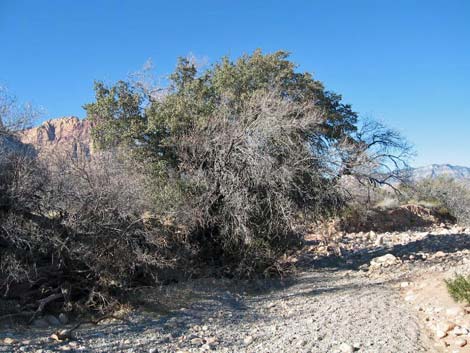 Oak trees along dry wash |
After birding along the spring and creek, walk back up the wash to the meadow. From the meadow, follow the trail along the south side of the wash back to the old road. Birders can just walk up the wash too. The Long Loop starts and ends with the Short Loop, but this route runs a little deeper into the area and passes the old concrete spring box. Wash Trail From the parking area, birders can go through the gates, walk down to the wash, and then just walk down the wash until the water disappears. Return over the same route. Hours Day-use only: sunrise to sunset. |
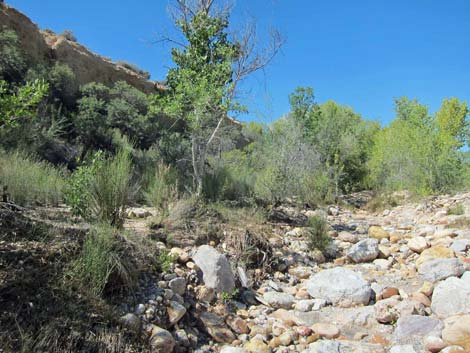 Mix of trees, desert, and maybe water (view NW) |
Fees None. Specialties Desert species (e.g., Woodhouse's Scrub-Jay, Verdin, Anna's Hummingbird, Mourning Dove, Phainopepla, House Finch, Gambel's Quail, Bewick's Wren) can be found here all year. During migration, watch for warblers, tanagers, orioles, Warbling Vireo, and other species as they pass through the area. During summer, this is a good site for Cooper's Hawk, warblers, flycatchers, and sparrows. Watch for Baja California Treefrogs and Red-spotted Toads in the creek, and watch for yellow-backed spiny lizards, coyotes, and small mammals (e.g., white-tailed antelope squirrel, black-tailed jackrabbit; kangaroo rat tracks and burrows in the sand). This probably is a good place for rattlesnakes too, so watch your step on trails in the overgrown areas. |
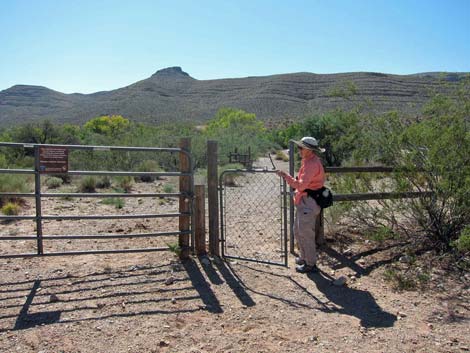 Birder going through the first gate (view S) |
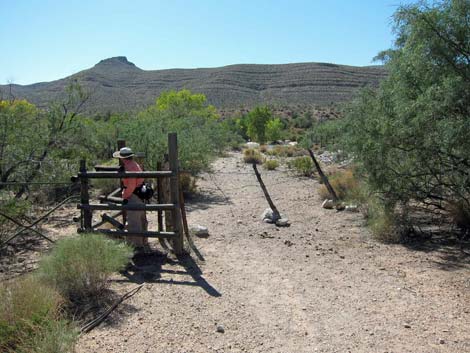 Birder going through the second gate (view S) |
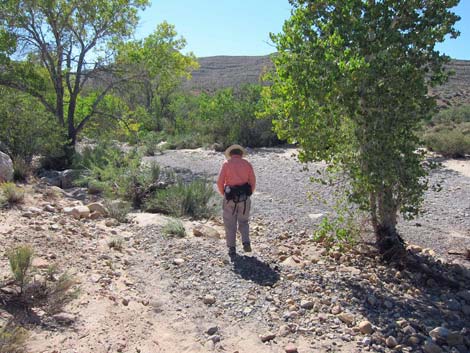 Birder approaching the wash (view S) |
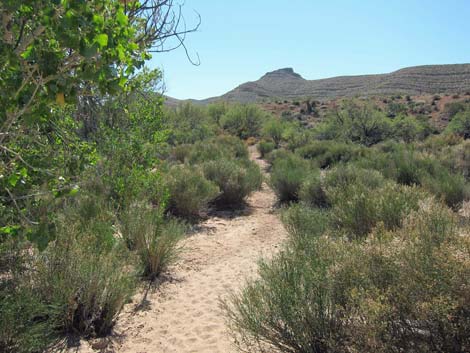 Across the wash, a trail run up the hillside (view S) |
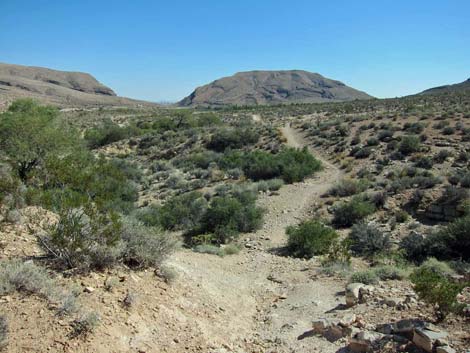 Atop the bluffs, the trail runs parallel to the wash (view E) |
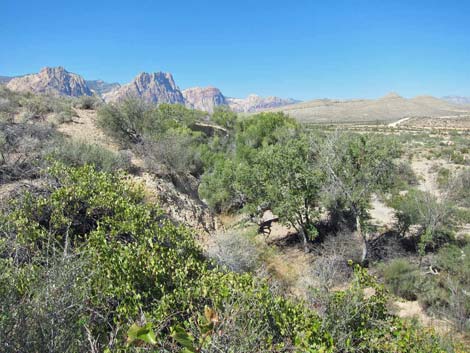 On the bluffs, birders can get treetop views (view NW) |
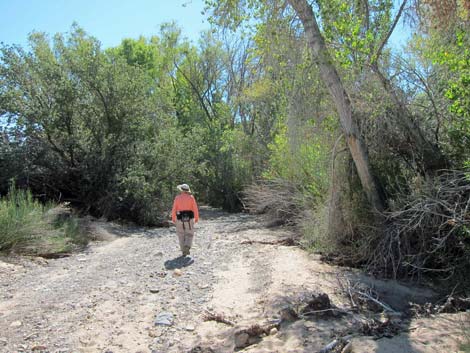 Birder in the wash (view SE) |
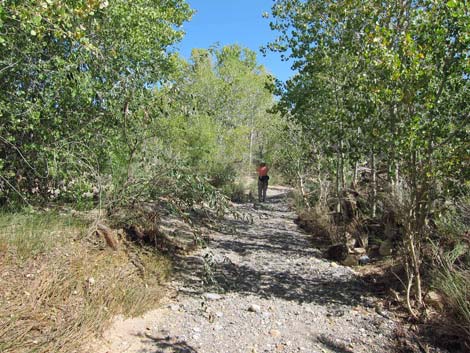 Birder in the wash (view SE) |
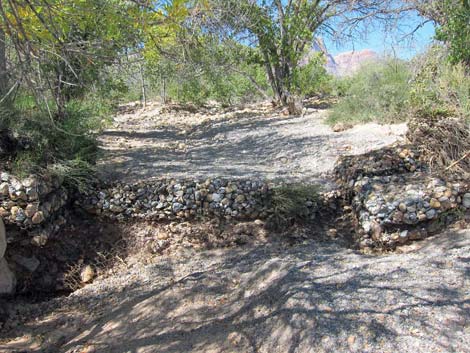 Weir in the wash (view NW) |
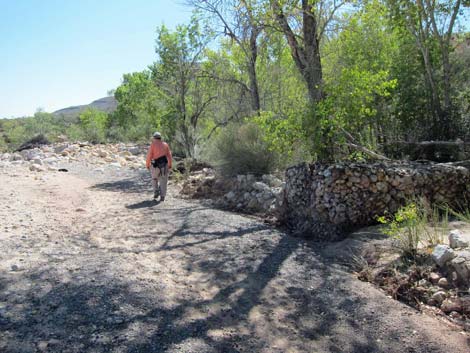 Birder in the wash (view SE) |
 The "camp" area (view NW) |
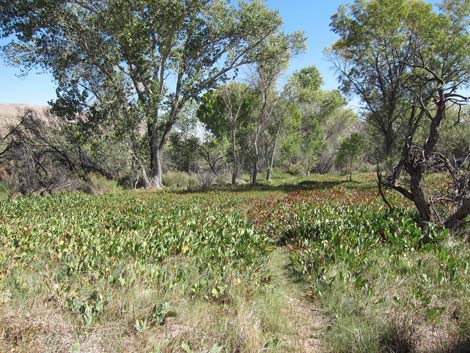 The "camp" area (view E) |
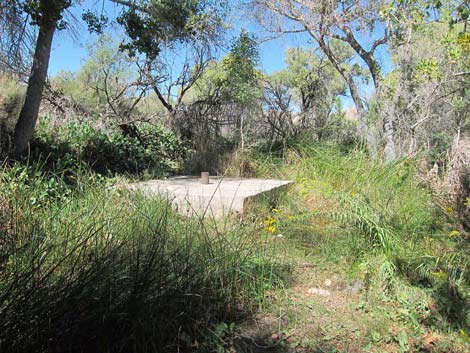 The old spring box (wellhead) |
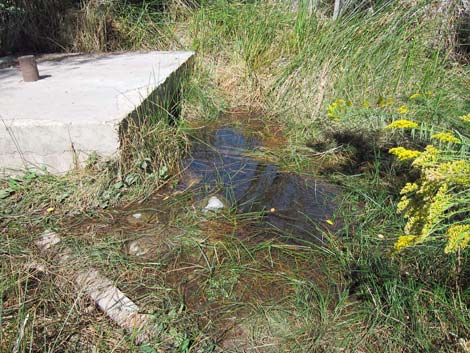 Water flowing out of the old spring box (wellhead) |
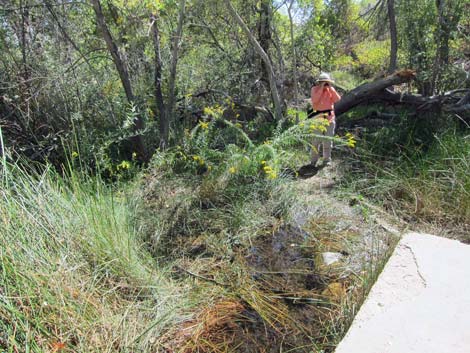 Water flowing out of the old spring box (wellhead) |
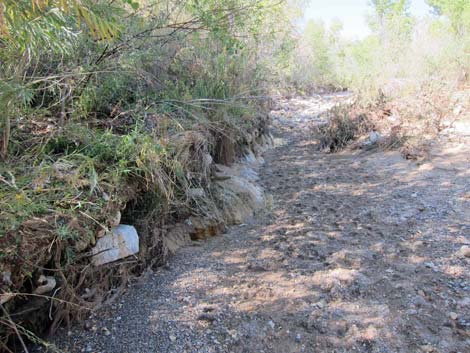 Damp area farther down the wash |
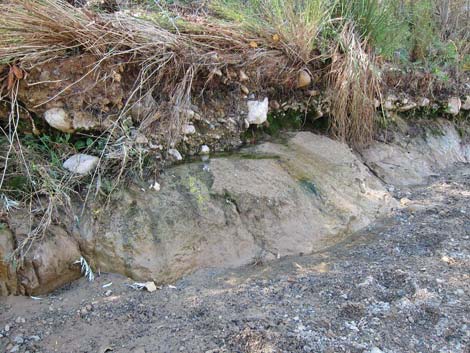 Damp area farther down the wash |
 Birder down in the wash (view NE) |
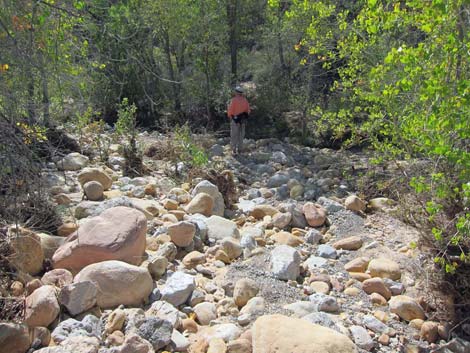 |
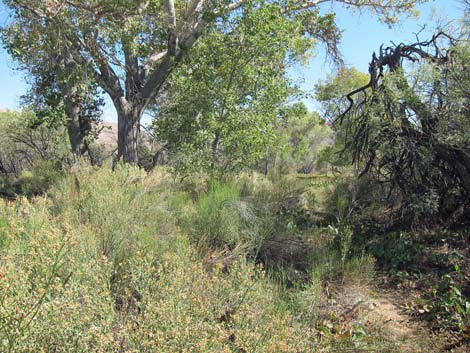 |
 |
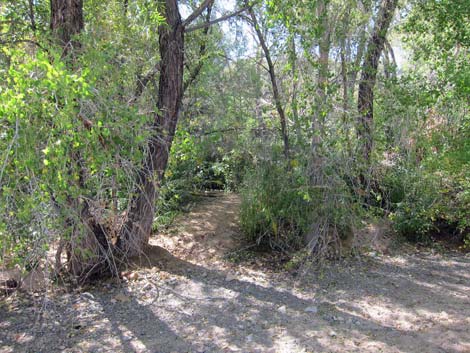 |
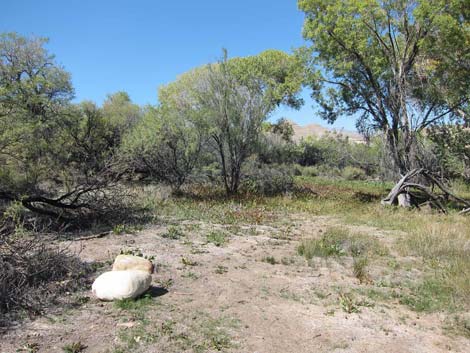 |
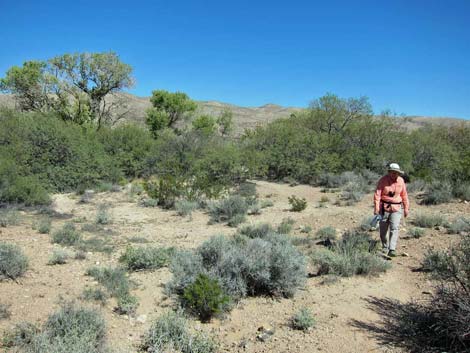 |
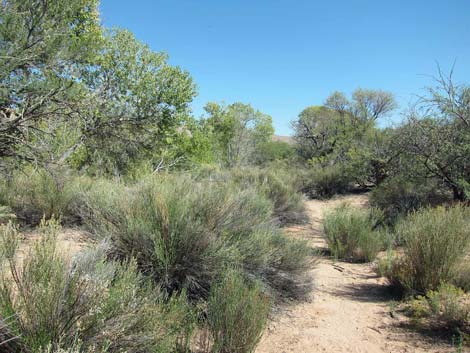 |
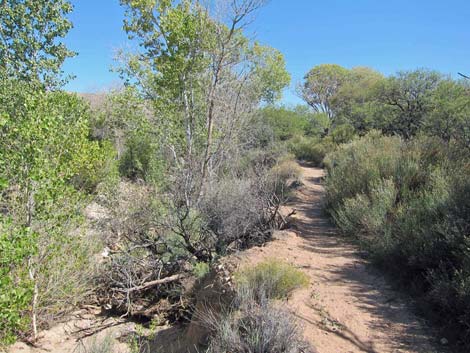 |
Happy birding! All distances, elevations, and other facts are approximate.
![]() ; Last updated 240323
; Last updated 240323
| Birding Around Las Vegas | Southern Nevada Birds | Guide Service | Copyright, Conditions, Disclaimer | Home |